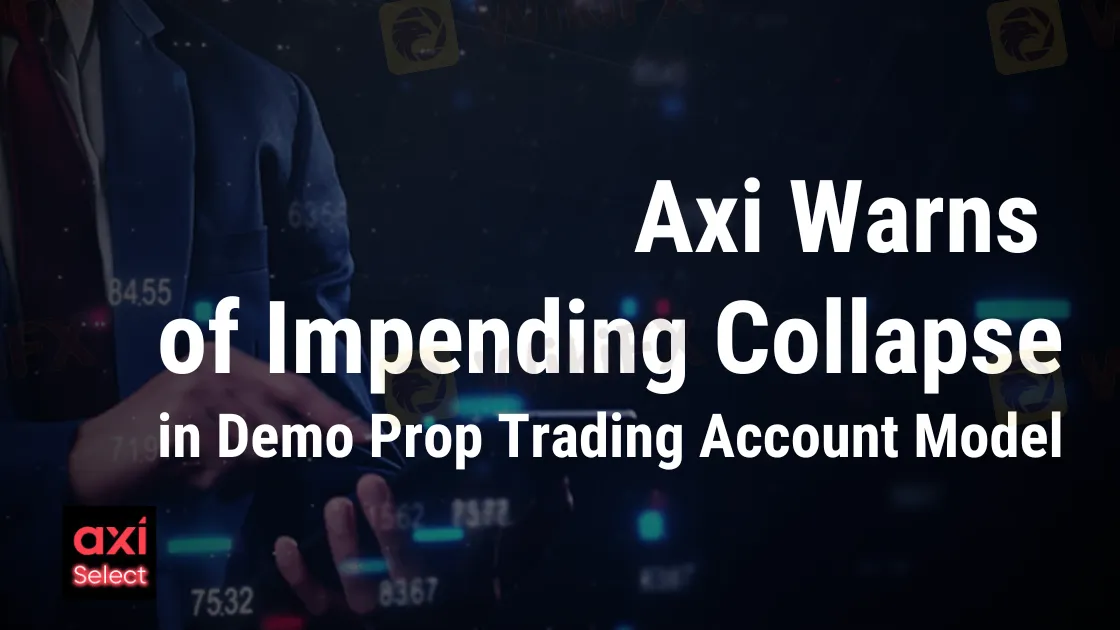简体中文
繁體中文
English
Pусский
日本語
ภาษาไทย
Tiếng Việt
Bahasa Indonesia
Español
हिन्दी
Filippiiniläinen
Français
Deutsch
Português
Türkçe
한국어
العربية
Axi Warns of Impending Collapse in Demo Prop Trading Account Model
Abstract:Axi, an Australian broker, signals the end of demo prop trading, promoting live trades via Axi Select amid industry challenges, offering a safer, long-term solution.

Axi, an Australian brokerage business, announced the probable extinction of the demo prop trading account concept, which many proprietary trading companies have embraced. Axi Select, the firm's proprietary trading platform, has 40% more active traders month over month.
The growth in Axi Select's user base comes at a crucial time for the proprietary trading industry, which is facing possible threats from MetaQuotes, the provider of the widely used MetaTrader platforms. Axi has voiced caution about the common demo trading methods used by proprietary businesses, differentiating itself by offering customers genuine trading chances.

Greg Rubin, Head of Axi Select, expressed his worries, claiming that the increase in real trading activity might signal the start of a slump for the demo account model inside proprietary trading businesses. Traditionally, these organisations operate in demo trading settings, using simulated scenarios to mimic real market circumstances based on trader behaviour. However, issues occur when rewarding traders using this strategy.
Numerous businesses that shut down due to strained relations with their brokerage partners have blamed recent disruptions in the proprietary trading market on vulnerabilities they discovered. MetaQuotes' activities against US-based organisations have pushed concerned corporations to seek alternatives to MetaTrader platforms.
Rubin praised Axi's proactive approach, saying, “We anticipated these developments, leading us to establish a capital allocation programme based on live trading accounts, accessible in over 100 countries for more than 16 years.” Axi Select's concept, which does not require a demo account registration fee, is positioned as a long-term solution for the proprietary trading community, free of the regulatory and technical challenges that other organisations face.

Axi launched its customised trading services in September, giving traders up to 90% of earnings. While the brokerage is licenced in renowned countries such as Australia and the United Kingdom, its proprietary trading services are offered via a corporation in St. Vincent and the Grenadines.
Axi emerges as a pioneer among big brokers offering proprietary trading services, with OANDA and Hentec Markets following suit. Notably, these corporations also run their proprietary trading services from overseas operations, with OANDA considering its proprietary trading customers as signal suppliers.
In the face of developing issues in the proprietary trading industry, Axi's revolutionary live trading strategy stands out as a possible game changer, providing a safe and long-term alternative to the traditional demo account structure. As the sector faces uncertainty, Axi's commitment to provide live trading possibilities might redefine the market for proprietary trading businesses.

Disclaimer:
The views in this article only represent the author's personal views, and do not constitute investment advice on this platform. This platform does not guarantee the accuracy, completeness and timeliness of the information in the article, and will not be liable for any loss caused by the use of or reliance on the information in the article.
Read more

New Year, New Surge: Will Oil Prices Keep Rising?
As of the writing of this article (January 2), oil prices stand at $71.88 per barrel. Investors need to continue monitoring whether the supply and demand dynamics will continue to push prices further up.

WikiFX Review: Something You Need to Know About Saxo
Founded in 1992, Saxo is a Danish investment bank that offers a wide range of investment products (stocks, ETFs, bonds, mutual funds, crypto ETPs) and leveraged products (options, futures, forex, forex options, crypto FX, CFDs, commodities). In today’s article, we will show you what it looks like in 2025.

Bithumb CEO Jailed and Fined Over Bribery Scheme in Token Listing Process
Lee Sang-jun, the former CEO of Bithumb, South Korea’s largest cryptocurrency exchange, has been sentenced to two years in prison and fined 52 million won ($35,367) for his involvement in a bribery scheme that manipulated the platform’s token listing process.

FINRA Orders Firms to Pay Over $8.2 Million in Restitution to Customers
FINRA orders $8.2M in restitution to customers for mutual fund sales charge waivers and fee rebate violations by Edward Jones, Osaic Wealth, and Cambridge.
WikiFX Broker
Latest News
WikiEXPO Global Expert Interview: Loretta Joseph——Unlock the forefront of digital finance
Vietnamese Police Bust $1.2 Million Crypto Fraud Case
XTB Receives Licenses to Operate in Indonesia & UAE
SEBI Bans Big "Finfluencers for Misleading Investors"
WikiFX New Year Bash: Chance to Win 70 USDT
Will Gold Break $2,625 Amid Fed Caution and Geopolitical Risks?
ECB Targets 2% Inflation as Medium-Term Goal
New Year, New Surge: Will Oil Prices Keep Rising?
WikiFX Review: Is HYCM still reliable in 2024?
Will Gold Shine Brighter in 2025?
Currency Calculator






